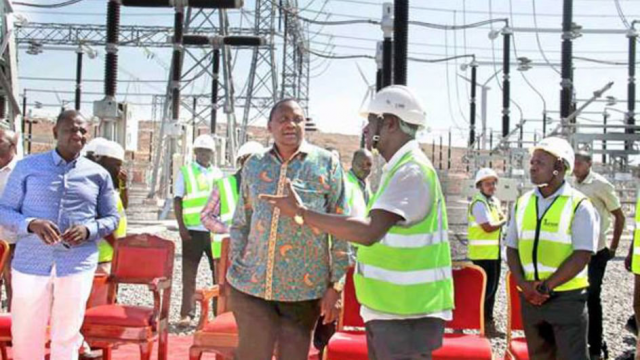NEWS June 7, 2020 — The Daily Nation (Kenya) “Covid-19 locks Kenya’s future in green energy”
For the original June 7, 2020, piece in The Daily Nation (Nairobi, Kenya), click here.
These institutions wrote that the real lesson from Covid-19 is that investments in renewable energy, both for homes and business, have remained profitable, while those in fossil fuel projects have tanked. Already, natural gas investment worldwide lost three per cent, petroleum four per cent, and coal is the big loser, down almost 10 per cent in the last three months, globally. There are many reasons for this, but all clearly show that the proposed Lamu coal plant would be a disaster for Kenya. As Kenyans struggle to stay healthy and earn their daily bread, we don’t know when the health and economic situation will improve. This pandemic only adds to existing challenges such as food insecurity, unemployment, electricity outages, floods and locust invasions. A coal plant will only make us more vulnerable.
First, coal projects are large, slow, and expensive, whilst the best energy options are nimble, scalable, and work well with other energy sources. The pandemic puts into sharp focus the peril of signing inflexible contracts for large fossil fuel power plants such as Lamu coal.
Even before the pandemic, coal energy didn’t make economic sense. To justify Lamu coal plant, proponents argued that energy demand in Kenya will grow by 11.5 per cent to 15 per cent per year. But in reality Kenya’s energy demand has been growing at about six per cent for over a decade. Even in 2019, The Energy and Petroleum Regulatory Authority (EPRA) concluded that Lamu coal plant would be “grossly underutilised should demand grow moderately” and cause electricity prices to “rise rapidly to reach Sh16.86/kWh by the year 2024”.
Now, any justification for Lamu coal has evaporated. Lamu coal plant would be left to idle — and become a dirty drag on the economy for decades. This is not how Vision2030 should turn out.
Covid-19 is profoundly changing the global economy. When the pandemic fades and energy demand does return, economic activity will spring up in unexpected areas and new sectors. Who knows what businesses will survive and which will change or die?
UNFAVOURABLE TERMS
Lamu coal plant’s financial obligations and risks would burden the country until 2045. The draft contracts were published on Treasury’s transparency website, revealing the unfavourable terms for the Kenyan public. The project can still be easily called off, but it is still in the pipeline. Why?
A coal plant won’t fix the outages and intermittency the country faces today. Kenya already produces enough electricity to meet demand, yet these problems persist. What we need is a better managed, responsive system that addresses problems and inefficiencies.
Renewable energy projects provide flexible energy — and rapid deployment just where the nation needs it.
All this leads to a wonderfully simple and nationally important bottom-line: Solar, wind, and geothermal power in Kenya are just plain less costly than coal. The country has been researching and writing about this for a long time, and now it is perhaps time to listen and act. That should be the end of the argument, but still some dinosaurs persist, largely because of backroom deals and outdated ideas about how unreliable renewable energy can be.
Kenya is the world leader today in installing the most reliable form of renewable energy — geothermal — and there’s potential for much more. Energy storage is now so cheap and available that solar or wind plus storage is still cheaper than coal. And diversifying our renewable sources will provide us with continuous and affordable electricity. Clean and reliable — fancy that.
ENVIRONMENTAL RUIN
All this is before we get to the long-term damage that coal will bring: environmental ruin.
The coal plant would saddle us with unavoidable environmental and health harms, from pollution and ecosystem destruction. As Bitange Ndemo stated, “Studies show that inhaling dirty air makes Covid-19 more lethal… There is no doubt that pollution causes diseases.”
Coal energy already didn’t make sense. Now it’s crystal clear: it’s dangerous, as well as a risky investment.
Lamu coal plant would also permanently disfigure one of the most beautiful and culturally unique seaside communities. When travel and tourism return after Covid-19, to have a disfigured Lamu is a sad, short-sighted slap in the face of every Kenyan.
There is another way. We can choose to stay on a low-carbon path to a future of least-expensive, reliable, renewable energy. As President Kenyatta has boasted, we are already 93 per cent there.
Even as we navigate this pandemic crisis, we are in control of how we pursue economic recovery. We can choose to create a new normal that’s better for everyone than what we had before. Reliable clean energy and a growing energy jobs sector are what the nation needs and deserves.
Instead of getting locked into coal, let us invest in power projects that benefit local host communities and Kenya at large.
Clean energy is a win-win-win. It provides us with affordable and flexible electricity, protects our health and environment, and supports an economy that can recover to work for more Kenyans.
_______________
Daniel Kammen is a Professor of Energy at the University of California, Berkeley where he has also served since 1999 as a Coordinating Lead Author for the Intergovernmental Panel on Climate Change (IPCC) that shared the 2007 Nobel Peace Prize. He has also worked in Kenya for 25 years on energy and environmental projects.
Twitter: @dan_kammen
Khadija Shekuwe Famau is the Program Coordinator for community sustainable development organization Save Lamu and a board member of Lamu County Municipality.
Twitter: @SaveLamu
Joseph Odongo is the Advocacy and Campaigns Coordinator, Friends of Lake Turkana (FoLT).
Twitter: @makodongo2

You must be logged in to post a comment.